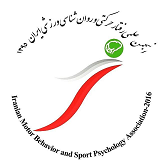Sat, Jul 19, 2025
[Archive]
Volume 3, Issue 1 (2-2021)
IJMCL 2021, 3(1): 41-46 |
Back to browse issues page
Download citation:
BibTeX | RIS | EndNote | Medlars | ProCite | Reference Manager | RefWorks
Send citation to:



BibTeX | RIS | EndNote | Medlars | ProCite | Reference Manager | RefWorks
Send citation to:
Esmaeilinasab M, Adnani S. (2021). Implicit or Explicit Body Awareness: which is more Efficient for Professional Athletes? Application of Embodied Cognition in Sport Science. IJMCL. 3(1), 41-46. doi:10.52547/ijmcl.3.1.41
URL: http://ijmcl.com/article-1-91-en.html
URL: http://ijmcl.com/article-1-91-en.html
Assistant Prof. of Psychology, Tarbiat Modares University, Tehran Iran , esmaeilinasab@modares.ac.ir
Abstract: (3389 Views)
Objective: Investigating factors that affect the performance of professional athletes has always been one of the important fields of sports science.
Objective: One of the important questions in this regard is whether athletes are better to be self-aware while performing physical movements or, conversely, this self-awareness as an interfering factor will lead to a decline in their performance.
Methods: In the present study, an attempt has been made to examine this issue with an interdisciplinary view based on the physical cognition approach, especially with the application of two models of Dreyfuss (2007) and the meshed architecture (Christensen, Sutton and McIlewin 2016; Gllagher, 2020).
Results: According to the first model, self-awareness will interfere with the performance of skillful movements, and in the opposite model, the performance of movements requires awareness of self, body and position.
Conclusion: Both approaches seem to rightly point to different aspects of awareness in performing movements; although awareness of the current situation is essential for performing movements, overt body awareness interferes with learning and performing movements and can have adverse psychological consequences for athletes in the long run.
Objective: One of the important questions in this regard is whether athletes are better to be self-aware while performing physical movements or, conversely, this self-awareness as an interfering factor will lead to a decline in their performance.
Methods: In the present study, an attempt has been made to examine this issue with an interdisciplinary view based on the physical cognition approach, especially with the application of two models of Dreyfuss (2007) and the meshed architecture (Christensen, Sutton and McIlewin 2016; Gllagher, 2020).
Results: According to the first model, self-awareness will interfere with the performance of skillful movements, and in the opposite model, the performance of movements requires awareness of self, body and position.
Conclusion: Both approaches seem to rightly point to different aspects of awareness in performing movements; although awareness of the current situation is essential for performing movements, overt body awareness interferes with learning and performing movements and can have adverse psychological consequences for athletes in the long run.
Keywords: Body Awareness, Embodied Cognition, Meshed Architecture, Professional Athletes, Cognitive Science
Type of Study: Reviews/Systematic Reviews/Meta-analysis |
Subject:
1-2. Neuroscience
Received: 2020/10/10 | Accepted: 2021/01/24
Received: 2020/10/10 | Accepted: 2021/01/24
References
1. Cappuccio, M.l. (2018). Handbook of embodied cognition and sport psychology. MIT press.
2. Chaturvedi, A. (2019). Against a "mindless" account of perceptual expertise. Phenom Cogn Sci, 18, 509-531. [DOI:10.1007/s11097-018-9557-z]
3. Christensen, W., Sutton, J., and Mcllwain, D. J. (2016). Cognition in skilled action: meshed control and the varieties of skill experience. Mind Lang. 31, 37-66. [DOI:10.1111/mila.12094]
4. Dreyfus, H. L. (2005). Overcoming the myth of the mental: How philosophers can profit from the phenomenology of everyday expertise. Proceedings and Addresses of the American Philosophical Association, 79 (2): 47-65.
5. Dreyfus, H.L. (2007). The return of the myth of the mental. Inquiry, 50 (4): 352-65. [DOI:10.1080/00201740701489245]
6. Dreyfus, H.L. (2007). Response to McDowell. Inquiry, 50 (4): 371-77. [DOI:10.1080/00201740701489401]
7. Ericsson, K. A. (2006). The Influence of Experience and Deliberate Practice on the Development of Superior Expert Performance. In The Cambridge Handbook of Expertise and Expert Performance, edited by K.A. Ericsson, N. Charness, P.J. Feltovich and R.R. Hoffman, 683-704. Cambridge: Cambridge University Press. [DOI:10.1017/CBO9780511816796.038]
8. Gallagher, S., & Zahavi,D..(2005) Phenomenological Approaches to Self-Consciousness, the Stanford Encyclopedia of Philosophy (Summer 2019 Edition), Edward N. Zalta (Ed.).
9. Gallagher, S., & Varga, S. (2020). Meshed Architecture of Performance as a Model of Situated Cognition. Frontiers in psychology, 11, 21-40. [DOI:10.3389/fpsyg.2020.02140] [PMID] [PMCID]
10. Høffding, S. (2018). A Phenomenology of Musical Absorption, Cham: Palgrave-Macmillan. [DOI:10.1007/978-3-030-00659-4]
11. Ilundáin-Agurruza, J., Krein,k., & Erickson,k. (2018). "High Performance, Risk Sports, and Japanese Thought and Culture Krein, Cappuccio, M. (Ed) The MIT Press Handbook of Embodied Cognition and Sport Psychology. Cambridge: MIT Press.
12. Kiverstein, J., & Miller, M. (2015). The embodied brain: towards a radical embodied cognitive neuroscience. Frontiers in human neuroscience, 9, 237. [DOI:10.3389/fnhum.2015.00237] [PMID] [PMCID]
13. Legrand, D., (2007). Pre-reflective self-consciousness: on being bodily in the world, Janus Head, 9 (2): 493-519
14. Montero, B. (2010). Does bodily awareness interfere with highly skilled movement? Inquiry, 53 (2):105-122. [DOI:10.1080/00201741003612138]
15. Montero, B. (2016). Thought in Action: Expertise and the Conscious Mind. New York: Oxford University Press. [DOI:10.1093/acprof:oso/9780199596775.001.0001]
16. Shusterman, R. (2008). Body consciousness: A philosophy of mindfulness and somaesthetics. Cambridge University Press. [DOI:10.1017/CBO9780511802829]
17. Strenberg.R. f (2006). Cognitive psychology. Australia: Belmont, CA:Thomson/Wadsworth ,4th ed.
18. Sutton, J. (2007.) Batting, Habit and Memory: The Embodied Mind and the Nature of Skill. Sport in Society ,10 (5). Routledge: 763-86. [DOI:10.1080/17430430701442462]
19. Sutton, J., McIlwain, D., Christensen, W., & Geeves A. (2011). Applying intelligence to the reflexes: embodied skills and habits between Dreyfus and Descartes. J British Society Phenomenology, 42 (1): 78-103 [DOI:10.1080/00071773.2011.11006732]
20. Wilson, A.& Foglia, L. (2011)."Embodied Cognition", The Stanford Encyclopedia of Philosophy (Spring 2017 Edition), Edward N. Zalta (ed).
Send email to the article author
| Rights and Permissions | |
 |
This work is licensed under Attribution 4.0 International (CC BY 4.0). |












